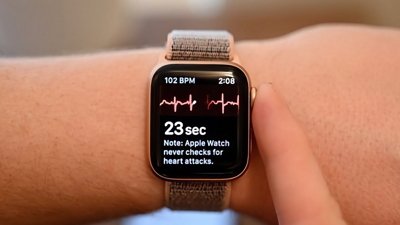Apple details iPhone 2.0 software, App Store
As part of its introduction of iPhone 3G, Apple has also unveiled the final version of its iPhone 2.0 software, including the App Store, iWork and Office document support, and numerous other features not mentioned during the March SDK event.
Reflecting the firmware's already confirmed Exchange support as well as the introduction of the new MobileMe Internet sync service, a previously revealed contact search feature will let users find information with results updated as the user types. In the mail application, it's now possible to quickly delete e-mail in bulk or move it to another folder, Apple adds.
Other additions will include much broader Asian character display and entry support with handwriting recognition, parental controls to limit access to apps, and a new calculator app that automatically switches to an advanced scientific format when the phone is tilted into landscape mode.
The version 2.0 upgrade will be preloaded on to iPhone 3G and will be available as a free download for all iPhone 2G owners in early July. Apple is charging $10 to upgrade the iPod touch and is believed to be doing so for worries that the US Sarbannes-Oxley Act requires charging for new features on products sold without a subscription-like revenue model.
Apple has also provided significantly expanded details about the App Store, the official source for third-party application downloads for both the iPhone and iPod touch.
The portal will be available through the devices or any iTunes-equipped computer at the same time as iPhone 2.0 and will be available through 62 out of the 70 countries receiving the iPhone later this year. Revenue sharing remains the same as that announced in March and will see developers keep 70 percent of the revenue from any paid applications. Download costs for free software will be absorbed by Apple, though all software is protected in the same FairPlay system as iTunes Store media downloads.
However, app downloads will also be limited over the cellular network to programs with a file size of 10MB or less. Larger software downloads will require the user to either use a Wi-Fi hotspot or to sideload the new software from a computer downloading the app through iTunes.
Options for distributing apps expand for business and educational customers, according to Apple. In enterprise, companies will have the ability to authorize only company iPhones for downloads and can show the app only to those on the company intranet, preventing confidential software or company details from being exposed.
Schools and other firms needing to distribute apps will also have access to a new sharing feature, dubbed Ad Hoc, that will permit as many as 100 authorized iPhones to use a third-party application without separate purchases.
Both solutions should be available as of the App Store's public debut.
 Katie Marsal
Katie Marsal










 Michael Stroup
Michael Stroup
 William Gallagher and Mike Wuerthele
William Gallagher and Mike Wuerthele
 William Gallagher
William Gallagher

 Chip Loder
Chip Loder
 Andrew Orr
Andrew Orr
 Marko Zivkovic
Marko Zivkovic
 David Schloss
David Schloss






